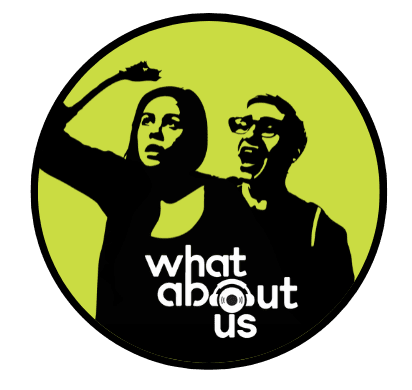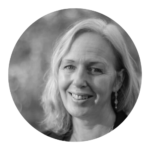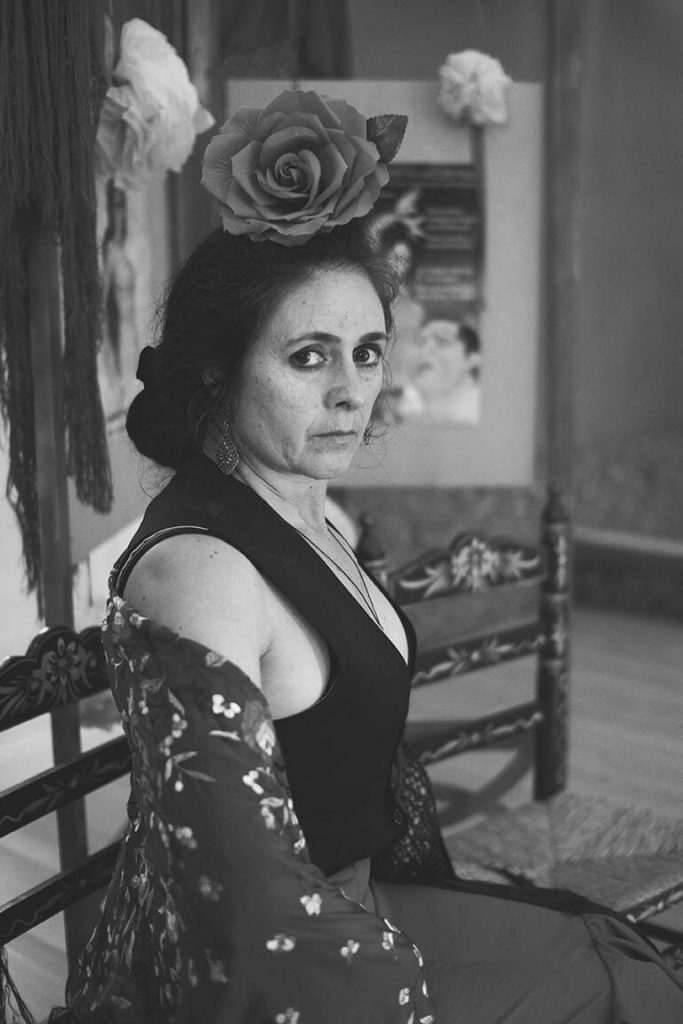
Shoshi Israeli
Choreographer, dancer, and all round fixer, Shoshi Israeli, knows all about breaking down borders. A passionate member of the What About Us team, Shoshi brings all her contacts and local knowledge to bear in doing everything she can to facilitate young Israeli and Palestinian musicians coming together.
Born in Jerusalem in 1961, when Israel was still a young country and before the wars that would transform the area forever, Shoshi’s parents emigrated from Persia.
“They were Jewish Iranian, this was the beginning of my love for the art world, connecting all the Iranian, Persian parts of my heritage, the Mediterranean. During my childhood there were a few wars, I lived through the six day war (1967), we had to stay in shelters, a lot of people that I know got killed in the war and from a very young age I would pray to the Jewish god, for peace in the world and for my family, my childhood was such a hard time.”
Shosi remembers an Israel radically different to the country of today: “When I was young, the Palestinians and the Israelis, we all lived next to each other – where I was born in Jerusalem the Palestinians would live on the next mountain and they would bring us vegetables and food. We really lived together, our country was the issue and with time it was very painful, very hard to see, because our cultures are so near, the music is really the same, even the food, and over the years we grow apart and that is really very sad.”
Like all Israelis, Shoshi did army service. “I did the army for three years – all Israeli citizens must do military service, it’s compulsory. When I was in the army, I was in charge of seventy soldiers, we all did the same training, walk 120 miles in the desert, living in tents, no showers. I thought by the time I had children that peace would come but it didn’t happen. It’s very urgent to do something.”
A lover of the art world
Her dream was always to dance and she went to Spain to learn Flamenco, a complex art form incorporating poetry, singing (cante), guitar playing (toque), dance (baile), hand-clapping (palmas), and finger snapping (pitos). It has a the call and response known as jaleo, a form of “hell raising,” involving hand clapping, foot stomping, and audiences’ encouraging shouts. Flamenco began in southern Spain, Andalusia and Murcia. Spain, and especially Southern Spain, fascinated Shoshi as it was one of the few places where historically, Jew, Arab and Christian lived together peacefully for centuries.
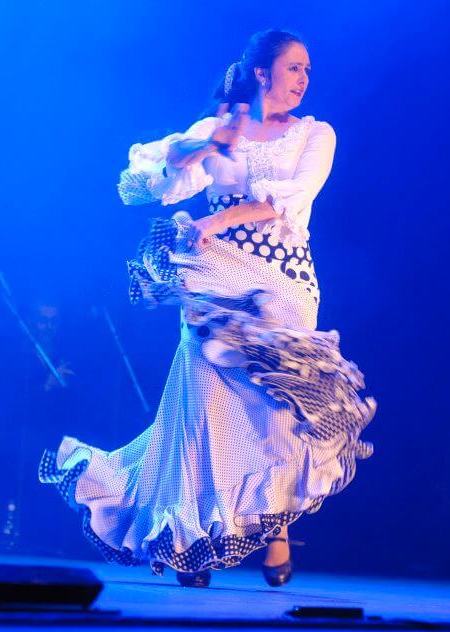
“I went to Spain for a few years, my dream was to dance flamenco, I was professional, I had a studio in Spain, I taught students, worked in a few institutions, founded a theatre, Cobeña Flamenco, I was artistic director and choreographer for the last twelve years”.
As well as running her company, Shoshi had other ambitions: “In 1999 I brought Palestinians and Israeli teenagers together to work on an idea, from Gaza, from all the territories, we brought artists that were on the edge, from both sides, to try and find bridges between individuals.”
Why Flamenco?
“It dates back to the ninth century when Jewish, Muslim and Christian lived together in harmony in Spain. It was a golden age, the idea is to bring them to a place that the three religion lived together and created together. In these workshops we did singing, dancing, percussion, we performed together, ate together, they realised the culture between the two sides is very similar.”
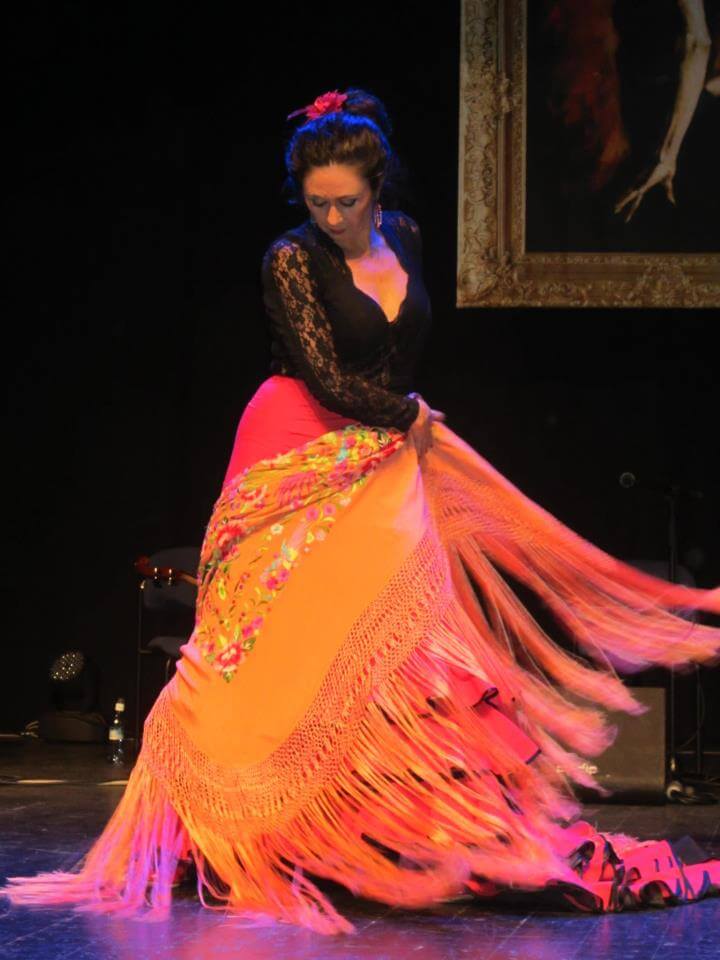
“We went to Granada, we worked in this beautiful Muslim palace, the idea was to take them outside of Israel, because the moment you take an artist out of their territory, everyone is on the same level, and communication can flourish and flow, as they are faraway they can talk about their problems without pressure. About their daily lives, they are both foreigners in Spain.”
After the first workshop, Shoshi repeated the project in Spain and Israel many times. “For ten years I worked with the gypsies in the prisons and for people from other cultures to come to their culture was really beautiful. I think that art can communicate, I think it must be part of our lives.”
Her work has taken all over the world. “For me it was very important to connect the art to the people, especially for women Flamenco is very important, it opens the upper body, closes the stomach, it gives you a lot of strength. I worked in psychiatric hospitals with young adults who had been raped and they are hunched so you teach them to open.
“Women give constantly, so it’s about open your chest and close your core. It’s connected to the ground through your footwork and the upper sky through your arms, it’s connected to the spiritual and when you do flamenco, you are in your body, you are pounding your feet, you cannot think about the husband, about the washing, it’s a meditation with rhythm and the voice, it’s very therapeutic, and for women it’s excellent, when you are on stage and you have ten men behind you and you are directing them, it’s empowering, you are strong! It’s not about the audience, you lead a group, for a woman on stage to lead them to tell them, faster, you are like a conductor of an orchestra you tell them what you need from them, you tell them, open, close, go fast, go slow, it’s a whole language.”

Israeli Culture
She is fascinated by all the different cultures her work has exposed her to: “Israeli culture is very open, it’s easy to work with women they are very open, like in Holland when I give a workshop, they will go out after class, drink, talk, in Spain they won’t stop talking. Israelis know everything – it’s very interesting to work with different cultures.”
Always on the go, involved in several projects, hard-working, motivated, what does she do to relax? “I dance! When I’m in Spain I go to the studio for 3-4 hours, I give classes, but I love that. Now with everything closed, I walk on the beach, I do yoga, I watch Flamenco online.” Shoshi has three children, her eldest is with her husband in Spain while the two younger ones are in Israel, currently in the army.
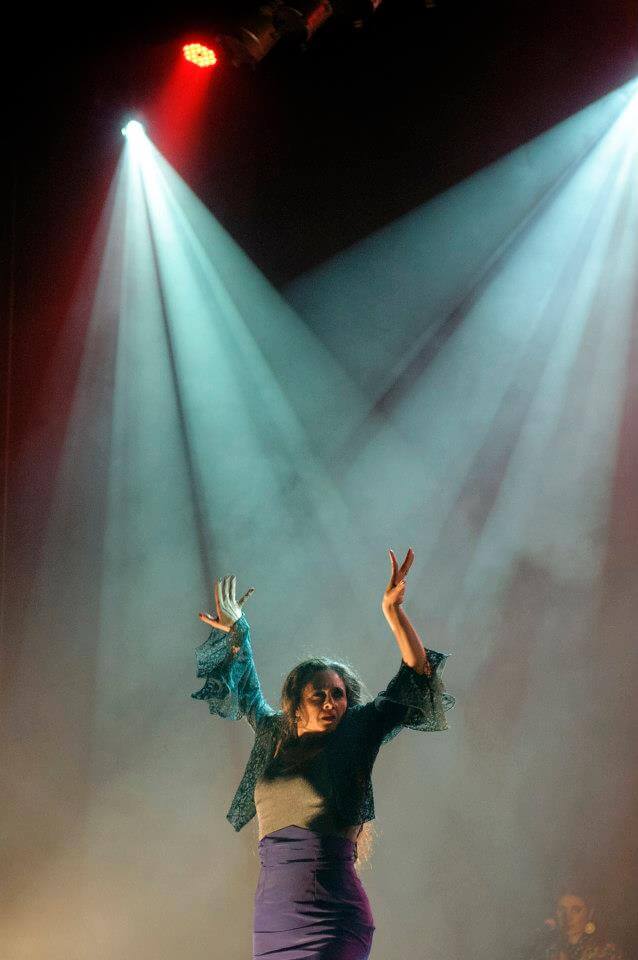
Is there a difference in the generations, how they see it? “My children were born in Spain, and they grew up with my peace projects. The young adults in Israel want to have peace, they all want to have good life, to work, to live peacefully. There are a lot of peace movements, people who want change. I hope things will be different. In Israel there are still bombs, terrorist attacks, the conflict is still alive, things are happening every day, so for the young generation there are no big wars, but things are still dangerous. When you’re on the street, you don’t know who is Arab, who is Israeli! Our culture is so similar, if you go out here, eat in restaurants, in hospitals, universities, Arabs are everywhere, it’s really mixed.”
Shoshi continually comes back to the similarities rather than the differences. “There is more in common than they realise, the food, the music, it is like two brothers that got into a fight and they don’t know why….but the Europeans want to solve the problem from their point of view, but it’s a very wrong point of view, because they put guilt on one side and they don’t see the good things that connect Israeli and Palestinian and this is important because we know what is wrong.”
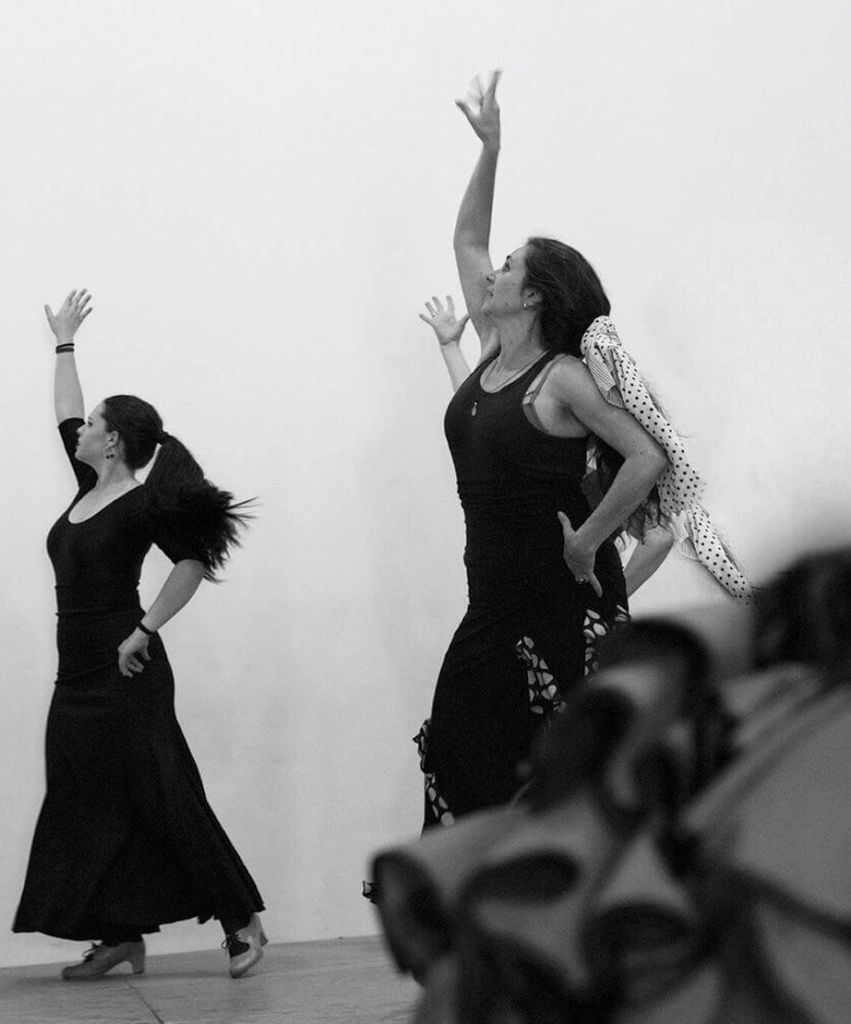
What About Us Project
As soon as Shoshi heard about What About Us, she was completely on board and is in many ways a driving force of the movement.
“I love this project, it will open up to the public, bring new ideas to people and start a movement. In July 2019, I met Stephen. I told him about my experience of workshops and he wanted to do workshops in Israel and Ireland, so I wrote a post on Facebook, I wrote it in English and Arabic and within one month I had 150 musicians, 80% who are professional musicians. We put them into groups, Aaron and I decided who went where.
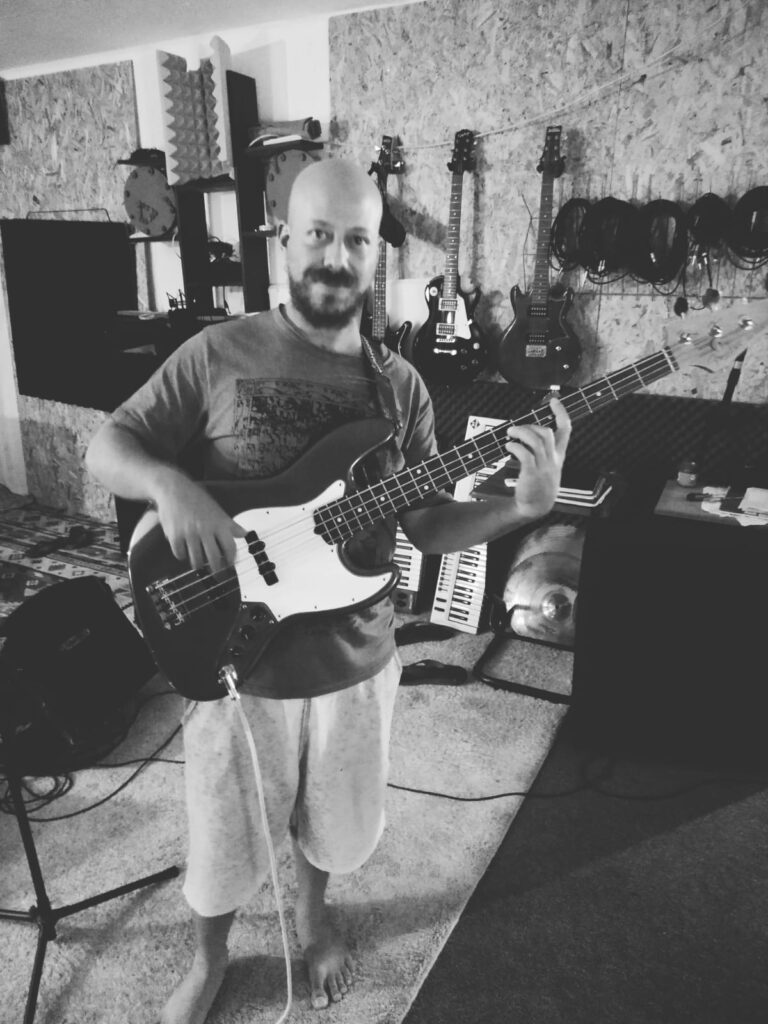
“We did the zoom meetings, the WhatsApp groups, we built this from nothing, then Covid came and Aaron built the Bandlab and everyone started doing everything online. We had a fundraising night for one of the musicians, a Palestinian, in one of the meetings he said he had the last goat in the backyard and when he kills this goat he has nothing left to eat. He’s on the other side of the wall, he takes care of his mother, his children, he’s a peace activist, and the wall is closed because of Covid. For this concert, it was musicians giving to musicians, it wasn’t something up in the air, it was something real.
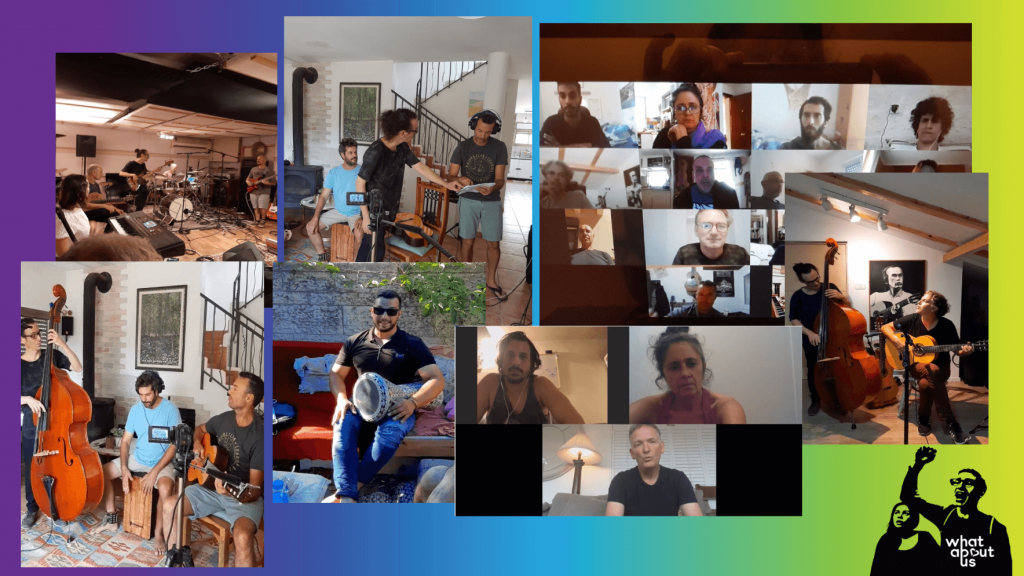
“We will meet, the art will flow, the story will be there, we will have the big idea of how to build a performance that is out of the box. To build a brilliant performance out of the box that the public will engage with and will cause questions and doubts and the audience will become activists, we really need this, it’s urgent, urgent on all levels.”
